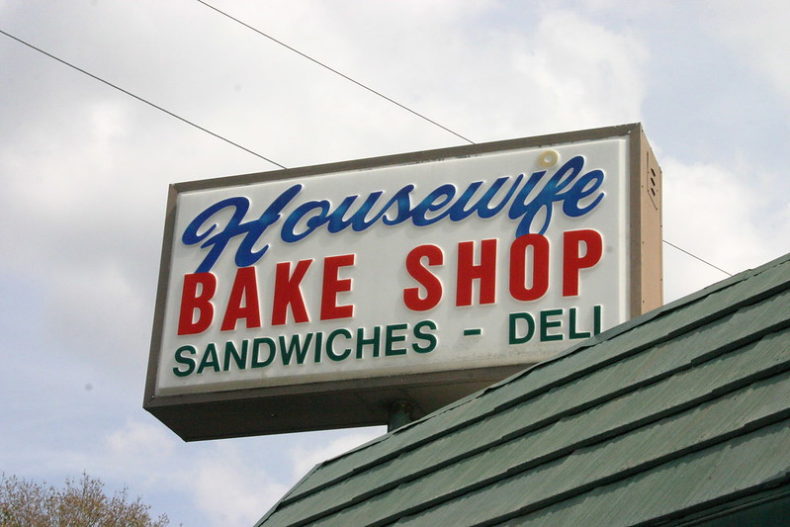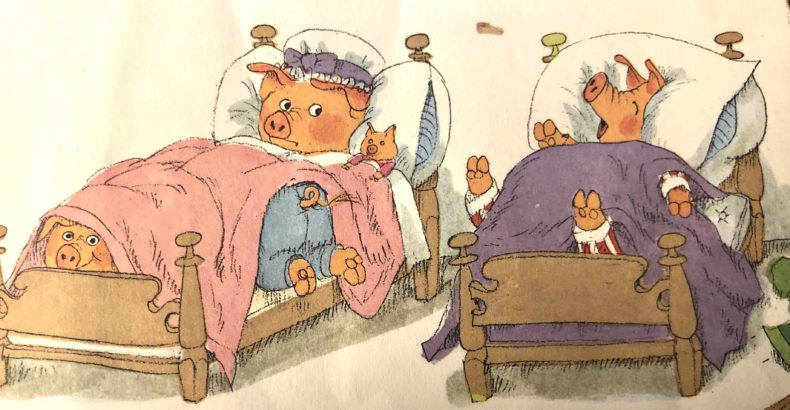
I first published this post in April, 2020. Today things are better, but not fixed. We have childcare, but it feels precarious. There are snow days and teacher training days and holidays and sick days. So Many Sick Days. On Mondays, public school ends at 1:45pm. ONE FORTY-FIVE! And there are still too many things to do and far too little time.
My daughter has a well-loved copy of Richard Scarry’s book, What Do People Do All Day? The book, first published in 1968, shows all the workers in Busytown at their various jobs. Kids love it. Adults love it. Four and a quarter stars on Goodreads.
But 1968 was a long time ago, a different era. And that might help explain why there’s a chapter titled “Mother’s work is never done.” Mommy Pig gets up, cooks breakfast, gets groceries, washes dishes, mops the floor, cleans the house, makes lunch, does laundry, and fends off a too-aggressive brush salesman. And here’s how it ends: Mommy makes dinner. Daddy Pig eats too much and breaks the kids’ bunk bed. And the kids HAVE TO SLEEP WITH MOMMY. “What would we ever do if we didn’t have mommies to do things for us all day — and sometimes all night?” Scarry writes.
I can think of a few things, and most of them involve Daddy stepping the fuck up. It is, by a wide margin, my least favorite chapter. (And there is an entire chapter devoted to cotton. So that’s saying something.)
For years I dithered about whether to have a child. I worried that much of the work would fall on me. But I had a baby anyway. And even though I have a loving and supportive spouse, the work was not split equally (surprise!) for a variety of reasons, some of them specific to my marriage and some of them systemic. I breastfed. I have the more flexible job. I am the one who worries and plans and does paperwork. I became chief operating officer of our household, a role I both relished and occasionally resented.

But it was mostly fine. And so, in January, I had another baby. I gave birth a week after China reported the first cluster of pneumonia cases. And then, of course, you know what happened next. The country went on lockdown and many American families lost their childcare, including us.
I was still on maternity leave when my daughter’s daycare closed, so I took on the bulk of the childcare for the first two weeks. And then my husband went on paternity leave for four weeks, and he took over. But this week, we swapped again.
This decision makes sense for our family. I’m freelance. I make less money. I don’t carry the health insurance. I love my children, but I never imagined that I would be their primary caregiver. ‘The coronavirus smashes up the bargain that so many dual-earner couples have made in the developed world: We can both work, because someone else is looking after our children,” writes Helen Lewis in her March essay “The Coronavirus is a Disaster for Feminism.” My career is suddenly a not-all-that-lucrative side hustle.
Oh how I wish I could simply ask daddy to step the fuck up. But he already has. My husband isn’t Daddy Pig. He doesn’t paint houses and then come home and stuff himself and break shit. He helps with the housework and the cooking and the children. The problem is that there is too much work and too many children and not enough time.
This all seemed doable when we thought we might have to get by for a month or two. But now the timeline seems indefinite. It’s unclear when daycares will open, or whether summer camp will happen. My daughter is supposed to start kindergarten in the fall, but even that seems to be in limbo. And we’re all freaking out. On Slack. On Facebook. On Instagram. Working moms didn’t sign up for this.
“The hundredth person just told me that Toni Morrison used to do all her writing before her kids woke up,” one friend lamented. But even Morrison longed for a respite. “My wish sometimes was that if someone would just take care of the children for a little while, then I wouldn’t have to go any place: I could just stay where I was,” she said in a 2015 interview.
I’m not sure I remember what a child-free house feels like. When the baby came, we had to rearrange rooms and I lost my office. I now work in a small, garish yellow closet in my daughter’s bedroom. She occasionally joins me in there, squeezing in to stand just behind my chair. “Can we play?” she asks. “When are you going to be done working?” she’ll ask 15 minutes after I have begun. (My husband also works from home, but we built him an office in the backyard in 2015, after we had our daughter.)
In 2015, a few months after first child was born, I wrote a letter to myself. “Here is what I wish I could make you understand,” I wrote. “This fork in the road, the one that feels so consuming and momentous, is just like any other fork. You pick left or right, and the choice propels you forward into the rest of your life. You will choose to have a child. But somewhere, maybe in one of Brian Greene’s parallel universes, you’ve taken the other road. And that path will lead you elsewhere, to a wholly different life. The choice does not define you. It does not change who you are. You will still be you. You are still you. But now you have a child.”
At the time, I felt like I was unearthing some universal truth. But when I read it now, the sentiment sounds incredibly naïve. Of course having kids matters. Of course something has to give. Maybe not at first. Maybe not all at once. But then the crisis comes, laying bare the inequalities we had nearly forgotten. Mother’s work is never done.